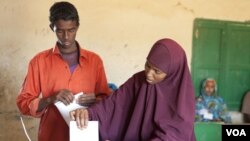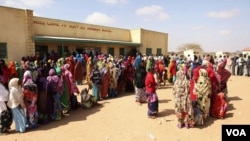Somaliland held municipal elections Wednesday. Seven political parties took part in the first poll for local councils since 2002.
Although Somaliland has declared itself an independent state, it has not received full international recognition since breaking away from Somalia in 1991.
The IEO -- International Election Observers -- has a team of more than 50 people in Somaliland. Dr. Steve Kibble, joint coordinator of the mission. From the capital Hargeisa, he said that Somaliland’s municipal elections are “important in several ways.”
“Somaliland has proved that it’s on the road to some form of democracy of its own making. We saw pretty free and fair elections, which contrast with some of the neighbors, it must be said.”
Kibble describes Somaliland as “an important player for some people even though it’s an unrecognized state.” He said Somaliland played a “key” role in international conferences on the Horn of Africa.
“I think there’s a kind of implicit recognition, not that I’m qualified to talk about recognition as an international observer. But recognition in the sense that people can see its value, and the fact that it’s on this road to a hybrid form of democratization, mixing sort of traditional and democratic forms,” he said.
Kibble was in Somaliland for the first municipal elections in 2002. Since then, a parliamentary election was held in 2005 and a presidential vote in 2010.
As for the election process, he said, “There have always been ups and downs. But in terms of the understanding of the Somaliland people for democracy, I think that has been a more and more sophisticated tactic. One always has to balance off sub-clan interests against individual interests and policy interests. That’s not very well formulated in many ways. But the actual mechanics of the electoral process are well understood, and people have been turning out in really big numbers today.”
Over 50 IEO mission observers are deployed over six regions, but they were not placed in any areas where their safety could be in jeopardy. The observers come from 18 countries, including the U.S. and Canada, many European nations, Kenya, Uganda and South Africa.
Kibble said, “Also, there are lots of volunteers that have paid their own way, paid their own expenses, flights, etcetera, to get here. So it kind of shows the interest.”
He said that elections can be “quite volatile” in Somaliland, adding, “people get very enthusiastic and exuberant. And sometimes the police kind of whip them into line a bit more than you would expect…in rather quieter North American [and] European countries. That having been said, it’s very heartening to see so many people queuing-up to vote in the pretty hot sun. Mostly, things appear to be pretty stable, pretty peaceful.”
There have been allegations of underage people attempting to vote and of the government driving its supporters to the polling stations. There are also reports of police firing in the air as part of crowd control.
“These are just allegations at the moment,” he said, “We will obviously try and check those out as much as possible. But the overwhelming mood from our observers, at the moment, is that things are going along fine.”
The IEO mission will issue an interim report on the municipal elections before it leaves. The findings will be presented to the National Electoral Commission. A final report may be issued in December.
Kibble said, “This is a rather complicated process where people vote for a local councilor, but also are voting to streamline seven political parties into three registered parties under the constitution.”
The election panel listed nearly 2400 candidates for about 350 council seats.
Although Somaliland has declared itself an independent state, it has not received full international recognition since breaking away from Somalia in 1991.
The IEO -- International Election Observers -- has a team of more than 50 people in Somaliland. Dr. Steve Kibble, joint coordinator of the mission. From the capital Hargeisa, he said that Somaliland’s municipal elections are “important in several ways.”
“Somaliland has proved that it’s on the road to some form of democracy of its own making. We saw pretty free and fair elections, which contrast with some of the neighbors, it must be said.”
Kibble describes Somaliland as “an important player for some people even though it’s an unrecognized state.” He said Somaliland played a “key” role in international conferences on the Horn of Africa.
“I think there’s a kind of implicit recognition, not that I’m qualified to talk about recognition as an international observer. But recognition in the sense that people can see its value, and the fact that it’s on this road to a hybrid form of democratization, mixing sort of traditional and democratic forms,” he said.
Kibble was in Somaliland for the first municipal elections in 2002. Since then, a parliamentary election was held in 2005 and a presidential vote in 2010.
As for the election process, he said, “There have always been ups and downs. But in terms of the understanding of the Somaliland people for democracy, I think that has been a more and more sophisticated tactic. One always has to balance off sub-clan interests against individual interests and policy interests. That’s not very well formulated in many ways. But the actual mechanics of the electoral process are well understood, and people have been turning out in really big numbers today.”
Over 50 IEO mission observers are deployed over six regions, but they were not placed in any areas where their safety could be in jeopardy. The observers come from 18 countries, including the U.S. and Canada, many European nations, Kenya, Uganda and South Africa.
Kibble said, “Also, there are lots of volunteers that have paid their own way, paid their own expenses, flights, etcetera, to get here. So it kind of shows the interest.”
He said that elections can be “quite volatile” in Somaliland, adding, “people get very enthusiastic and exuberant. And sometimes the police kind of whip them into line a bit more than you would expect…in rather quieter North American [and] European countries. That having been said, it’s very heartening to see so many people queuing-up to vote in the pretty hot sun. Mostly, things appear to be pretty stable, pretty peaceful.”
There have been allegations of underage people attempting to vote and of the government driving its supporters to the polling stations. There are also reports of police firing in the air as part of crowd control.
“These are just allegations at the moment,” he said, “We will obviously try and check those out as much as possible. But the overwhelming mood from our observers, at the moment, is that things are going along fine.”
The IEO mission will issue an interim report on the municipal elections before it leaves. The findings will be presented to the National Electoral Commission. A final report may be issued in December.
Kibble said, “This is a rather complicated process where people vote for a local councilor, but also are voting to streamline seven political parties into three registered parties under the constitution.”
The election panel listed nearly 2400 candidates for about 350 council seats.





